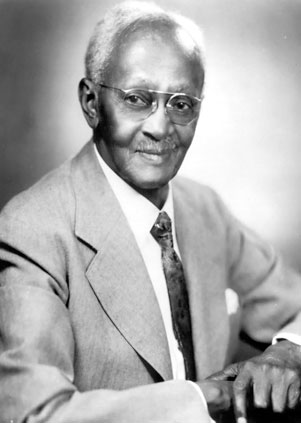
Black History, Business, Education

Richard Robert Wright, Sr.
Despite being born a slave on May 16, 1855, Major Richard Robert Wright, Sr. was a post-reconstruction pioneer and trailblazer, who made remarkable contributions in education, banking, politics, publishing, journalism, real estate, and civic affairs. Among his many accomplishments, he founded a high school, a college, and a bank; and owned several newspapers.
He also founded the National Freedom Day Association, and worked toward establishing a national day to commemorate freedom for all people.
On February 1, 1941, Major Wright invited national and local leaders to meet in Philadelphia to formulate plans to set aside February 1st each year to memorialize the signing of the 13th Amendment to the Constitution by President Lincoln on February 1, 1865. One year after Wright’s death in 1947, a bill passed both U.S. Houses of Congress, making February 1st National Freedom Day, and was signed into law on June 30, 1948. (more…)
Black History, Business

eorge B. Vashon
George Boyer Vashon, attorney, scholar, essayist and poet, made noteworthy contributions to the fight for emancipation and education of blacks. He was born on July 25, 1824, in Carlisle, Pennsylvania, the third child and only son of an abolitionist, John Bethune Vashon. At the age of 16, Vashon enrolled in Oberlin Collegiate Institute in Ohio. On August 28, 1844, Vashon earned his Bachelor of Arts degree with valedictory honors, becoming the college’s first black graduate. Five years later, Vashon was awarded a Master of Arts degree in recognition of his scholarly pursuits and accomplishments.
After returning to Pittsburgh, he studied law under Judge Walter Forward, a prominent figure in Pennsylvania politics. After two years of reading law, Vashon applied for admission to the Allegheny County bar. His application was denied on the grounds that colored people were not citizens. This inequitable act led to Vashon’s decision to emigrate to Haiti. Before leaving the United States, Vashon went to New York to take the bar examination, which he successfully completed on January 10, 1848, thus becoming the first black lawyer in New York. (more…)
Black History, Business, Government
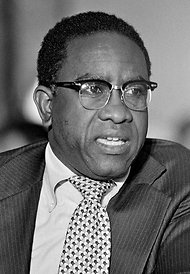
William E. Sauro/The New York Times
Andrew F. Brimmer in 1974, shortly after he resigned from the Fed board.
Andrew F. Brimmer, a Louisiana sharecropper’s son, was the first black member of the Federal Reserve Board. Dr. Brimmer, an economist, held a number of high-ranking posts in Washington and taught at Harvard, but the economic conditions of poor, powerless, uneducated blacks was an abiding concern. He spoke about what he called the “schism� between blacks who were educated and had marketable skills and those who did not. In later years he spoke frequently about how government policies no longer supported programs to help blacks enter the economic mainstream.
Dr. Brimmer was the assistant secretary of commerce for economic affairs when President Lyndon B. Johnson named him to the Fed board in 1966.
At the time, the Federal Reserve was bitterly divided over monetary policy. The chairman, William McChesney Martin Jr., threatened to resign if Mr. Johnson appointed a liberal who would vote in favor of lower interest rates. (more…)

Black History, Business, Other
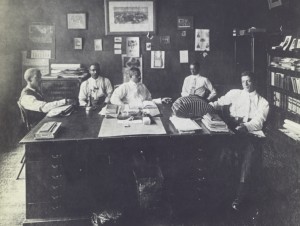
Officers of the North Carolina Mutual Life Insurance Company in 1911
Since its beginning in 1898, North Carolina Mutual Life Insurance Company has grown to become one of the nation’s most widely-known and successful business institutions. It is the only insurance company domiciled in North Carolina with a charter dated before 1900. North Carolina Mutual is the oldest and largest African American life insurance company in the United States.
The Company’s seven organizers were men who were active in business, educational, medical and civic life of the Durham community. An early financial crisis tested their resolve and the company was reorganized in 1900 with only John Merrick and Dr. Aaron M. Moore remaining. Charles C. Spaulding was named General Manager, under whose direction the company grew and achieved national prominence. (more…)
Black History, Business
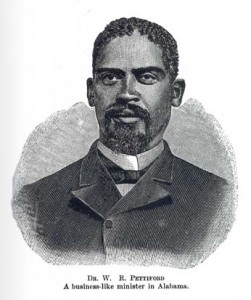 The Penny Savings Bank, founded by Reverend William Reuben Pettiford in Birmingham in 1890, was the first black-owned and black-operated financial institution in Alabama. Created as a necessity of de facto and later codified segregation, the bank backed and encouraged development of black businesses, especially in urban areas, as well as savings by African Americans, until its closing in 1915.
The Penny Savings Bank, founded by Reverend William Reuben Pettiford in Birmingham in 1890, was the first black-owned and black-operated financial institution in Alabama. Created as a necessity of de facto and later codified segregation, the bank backed and encouraged development of black businesses, especially in urban areas, as well as savings by African Americans, until its closing in 1915.
William Reuben Pettiford
William Reuben Pettiford was born to free parents in North Carolina in 1847. He moved to Alabama in 1869 to seek better educational and financial opportunities. After seven years of studying while holding down jobs, Pettiford completed his degree at the Lincoln Normal School (a predecessor of Alabama State University) in Marion, Perry County. In 1877, Pettiford became a teacher at Selma University and simultaneously entered the theological department of the school, taking courses from President Harrison Woodsmall.
Three years later, he voluntarily severed his connection with the school to become pastor of the First Baptist Church of Union Springs, where he also served as principal of the city school for African Americans. In 1883, he accepted the pastorate of the First Colored Baptist Church of Birmingham, later named the Sixteenth Street Baptist Church, at the urging of state Baptist leaders and educator Booker T. Washington, who assured him that he could provide necessary leadership for Birmingham’s expanding black population.
(more…)
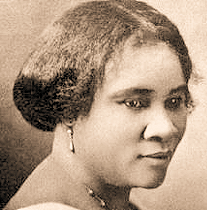
Black History, Business, Firsts

Madame C.J. Walker
Born Sarah Breedlove on December 23, 1867 on a Delta, Louisiana plantation, this daughter of former slaves transformed herself from an uneducated farm laborer and laundress into one of the twentieth century’s most successful, self-made women entrepreneurs.
Orphaned at age seven, she often said, “I got my start by giving myself a start.” She and her older sister, Louvenia, survived by working in the cotton fields of Delta and nearby Vicksburg, Mississippi. At 14, she married Moses McWilliams to escape abuse from her cruel brother-in-law, Jesse Powell.
Her only daughter, Lelia (later known as A’Lelia Walker) was born on June 6, 1885. When her husband died two years later, she moved to St. Louis to join her four brothers who had established themselves as barbers. (more…)






